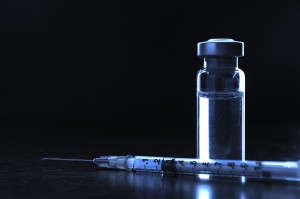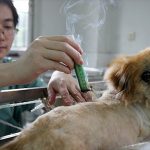What to Expect After Your Pets Vaccination

The AVMA has published a PDF on their website, entitled “What to expect after your pet’s vaccination.”
Here is the information they are giving to pet owners:
It is common for pets to experience some or all of the following mild side effects after receiving a vaccine, usually starting within hours of the vaccination. If these side effects last for more than a day or two, or cause your pet significant discomfort, it is important for you to contact your veterinarian:
Discomfort and local swelling at the vaccination site
Mild fever
Decreased appetite and activity
Sneezing, mild coughing, “snotty nose†or other respiratory signs may occur 2-5 days after your pet receives an intranasal vaccine
More serious, but less common side effects, such as allergic reactions, may occur within minutes to hours after vaccination. These reactions can be life-threatening and are medical emergencies. Seek veterinary care immediately if any of these signs develop:
Persistent vomiting or diarrhea
Itchy skin that may seem bumpy (hives)
Swelling of the muzzle and around the face, neck, or eyes
Severe coughing or difficulty breathing
Collapse
A small, firm swelling under the skin may develop at the site of a recent vaccination. It should start to disappear within a couple weeks. If it persists more than three weeks, or seems to be getting larger, you should contact your veterinarian.
Always inform your veterinarian if your pet has had prior reactions to any vaccine or medication. If in doubt, wait for 30-60 minutes following vaccination before taking your pet home.
Aside from potential collapse, it appears that vaccination is a pretty innocuous procedure (no pun intended). This is a pretty short and not-very-scary list. It’s no wonder pet owners are more than willing to allow vets to over-vaccinate their pets: we are all told about the potential good that vaccines do (vets are fond of scaring themselves and us into vaccination with “we just had a dog die of _____________ here last week,” but rarely are we informed of the potential dangers. It would also appear that the vets are unaware of the dangers, if their own views on vaccine dangers match those of the AVMA.
What Some Veternarians Are Saying:
In case you are wondering what the real dangers of vaccination are, we will share with you a list complied by veterinary immunologist Dr. Ronald Schultz. Dr. Schultz has vaccinated thousands of animals during his clinical research and although he advocates vaccines, he tempers that recommendation with a realistic view of their inherent dangers. (My italics: Dr. Schultz only recommends one-time vaccinations at 14, or 15 weeks of age. For the dog: Parvo and Distemper; and for the cat, Distemper. Then at 12 to 18 months the rabies shot. He states research shows those one-time puppy/kitten shots are good for life).
Here is Dr. Schultz list:
Common Vaccine Reactions:
Lethargy
Hair Loss, hair color change at injection site
Fever
Soreness
Stiffness
Refusal to Eat
Conjunctivitis
Sneezing
Moderate Vaccine Reactions:
Oral ulcers
Immunosupression
Behavioral Changes
Vitiligo
Weight Loss (Cachexia)
Reduced Milk Production
Lameness
Granulomas/Abscesses
Hives
Facial Edema
Atopy
Respiratory Disease
Allergic uveitis (Blue Eye)
Severe Reactions Triggered By Vaccines:
Injection site sarcomas (especially for cats)
Anaphylaxis
Arthritis, polyarthritis-HOD hypertrophy Osteodystrophy
Autoimmune Hemolytic Anemia
Immune Mediated thrombocytopenia (IMTP)
Hemolytic Disease of the newborn (Neonatal Isoerythrolysis)
Thyroiditis
Glomerulonephritis
Disease or Enhanced Disease which with the vaccine was designed to prevent
Myocarditis
Post vaccinal Encephalitis or polyneuritis
Seizures
Abortion, congenital anomalies, embryonic/fetal death, failure to conceive fertility
“Safety studies on vaccinations are limited to short time periods only: several days to several weeks. There are NO (NONE) long term (months or years) safety studies on any vaccination or immunization. For this reason, there are valid grounds for suspecting that many delayed-type vaccine reactions may be taking place unrecognized as to their true nature,” says Dr. Harold Buttram, MD.
The AVMA and AAHA continue to recommend over-vaccination for our pets, despite the fact that there is scant evidence that they prevent less disease than they cause. Is this because they are not aware of the potential dangers of vaccines? It’s not a warm and fuzzy feeling thinking that the veterinary associations don’t understand the dangers associated with vaccines. But it beats the alternative: that they are aware of the dangers but recommend over-vaccination anyway.
References:










